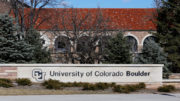By Jeffrey A. Roberts
CFOIC Executive Director
A bill to require the livestreaming of meetings of state and local boards, councils and commissions “will not go forward” in the 2024 Colorado legislative session because of its high estimated cost, the measure’s sponsor told constituents in a newsletter this week.
“A huge disappointment for me this Session has been the large Fiscal Notes from various Colorado State Departments/Governor,” wrote Rep. Meg Froelich, D-Greenwood Village. “As a result our efforts for people — particularly persons with disabilities — to have access to public meetings (HB 1168) will not go forward because the first floor put a $1m price tag on access. This is 30 years after the Americans with Disabilities Act and 3 years after COVID-19 demonstrated how to hold meetings with online participation.”

In an email to the Colorado Freedom of Information Coalition, Froelich confirmed that she expects House Bill 24-1168 will not be heard in the House Appropriations Committee before the legislative session ends May 8.
The bill passed the House Transportation, Housing and Local Government Committee a month ago after lawmakers reworked the proposal to try to reduce its impact on state and local government budgets. Even so, a revised fiscal note from Legislative Council staff estimated it would require state expenditures of nearly $1.4 million in FY 2025-26.
The measure would have mandated, beginning July 1, 2025, the real-time video or audio streaming of state and local public body meetings for which notice is required by the Colorado Open Meetings Law “and at which the adoption of any proposed policy, position, resolution, rule, regulation, or formal action will occur.” Meetings at which public comment or testimony is heard also would have been livestreamed.
The bill additionally required public bodies to 1) offer a remote public comment option at meetings where public comment is heard and 2) post meeting materials at least 24 hours before a meeting or “as soon as practicable.”
The requirements would have been less stringent for small communities, defined in the bill as any authority, district or political subdivision of the state with fewer than 1,000 eligible electors at the time of the last election. For those public bodies, remote access and remote testimony would have been provided “upon receipt of a timely request.” For public bodies in areas without broadband access, livestreaming and remote testimony would not have been mandatory.
The fiscal note lists “increased expenses for administrative staff and assistance with virtual meeting coordination” for state agencies, such as making sure meeting documents are available in real time during meetings. Other costs include the expected need for capital upgrades and “major information technology purchases.” For local governments, the fiscal note mentions increased costs for virtual meeting coordinators, video conferencing platform licenses and possible capital improvement expenses for public bodies “that do not currently have the necessary meeting spaces and hardware.”
Froelich and co-sponsoring Rep. Manny Rutinel, D-Commerce City, carried HB 24-1168 to improve access to government for people with disabilities.
“This bill affirms the right to participate in our democracy,” Froelich said during the committee hearing in March.
CFOIC supported the bill. In testimony, we noted that the Cherry Creek school board only recently announced, after public pressure, it would begin livestreaming meetings. We also noted that some public bodies still make it difficult for journalists and the public to obtain board packet materials.
Follow the Colorado Freedom of Information Coalition on Twitter @CoFOIC. Like CFOIC’s Facebook page. Do you appreciate the information and resources provided by CFOIC? Please consider making a tax-deductible donation.




